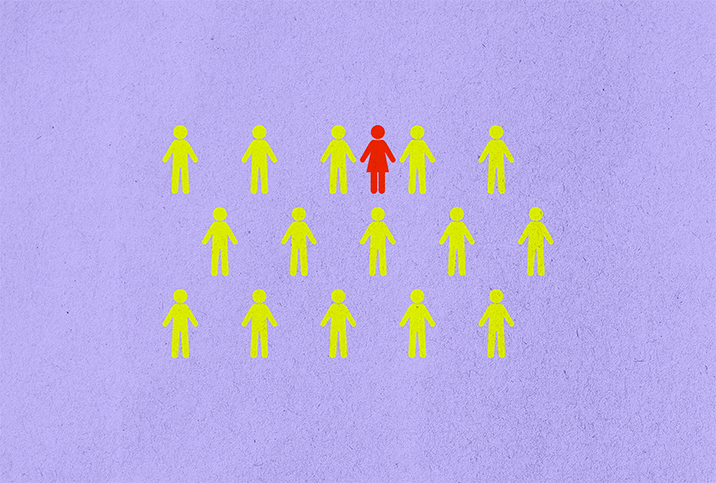Bombs Away: A Love Bomb Explainer

If you're a frequent user of TikTok, Instagram or Twitter, you probably already know that social media loves to latch onto certain viral heroes and villains. A few weeks ago, social media found a new villain of the moment: West Elm Caleb.
Here's the story in a nutshell: One girl posted a TikTok video about dating a New York City guy named Caleb, who worked at a West Elm home decor store. He showered her with attention and affection before promptly ghosting her after a few dates. The plot thickened when countless other New Yorkers claimed to have had the same experience while dating "West Elm Caleb."
Caleb's technique of showering women with love before disappearing back to West Elm was quickly labeled as "love bombing."
Love bombing: A dangerous new dating trend or passing social media term?
Based on the viral West Elm Caleb story, many social media users were led to believe "love bombing" simply referred to a person feigning interest in another person before ghosting them. However, in reality, the phenomenon is a little more complex and potentially more sinister.
"'Love bombing' is a term coined to represent excessive attention and affection with a goal to manipulate people," relationship coach from Mamma Wellbeing Kapil Gupta explained. "It is a conscious effort."
Sometimes, love bombing can actually look relatively similar to "normal" dating habits.
"Excessive attention or affection could be a result of someone's own insecurities and lack of self-worth," Gupta said. "For example, when we start a new potential relationship, we want to present our best self to impress someone."
'Being a victim of an act is different from living in victim consciousness, and we live in a world where living in victim consciousness is rewarded.'
In other words, it's pretty normal to show affection and attraction in the early stages of a relationship. However, when these tactics are used with the intent to manipulate or when they become love bombing, it can turn harmful.
Because love bombing should only be used to describe situations in which manipulation is consciously intended, it's easy to think you've been a victim of love bombing. Was West Elm Caleb, for instance, really a case of love bombing? Or is he just a serial dater who has a very bad habit of ghosting women after he loses interest?
"In the case of West Elm Caleb, if he is doing it in a conscious and planned way and the women feel manipulated, then you could technically call it love bombing," Gupta said. "Being a victim of an act is different from living in victim consciousness, and we live in a world where living in victim consciousness is rewarded."
Why real cases of love bombing can be so dangerous
Social media has a tendency to use the term love bomb to refer to online daters who initially seem interested and then disappear into thin air. But real cases of love bombing can be far more traumatic and serious than the average case of ghosting.
Tina*, a 33-year-old from Ohio, experienced this firsthand: Tina's ex-husband was a classic love bomber.
"He really made me feel like I was the answer to all his prayers, the woman he had been waiting for, the puzzle piece he had been missing—from day one," she told us. He bought her endless gifts and constantly paid her compliments. "He really felt like a Prince Charming, you know?" she said.
After two months of dating, he proposed. But after that, everything changed. He began to withdraw himself from the relationship. He belittled Tina in front of friends and family. But even as his behavior changed, Tina clung to the relationship.
"I thought he was just having a bad day or week or month because I knew him…I knew he loved me because of how he had treated me at first," she explained. "Turns out, he never did."
Eventually, the relationship fell apart—Tina's husband cheated and she asked for a divorce.
"Four days later, he was dating new people," she recalled.
'I'm still fighting demons from those days and it's been almost five years since we've been together. He crushed my identity, confused the hell out of me and made me question everything.'
Tina thought she had met her soulmate—she had found an attentive, loving, passionate partner. So, the initial stages of the love bombing were, as she put it, "amazing." However, when everything changed overnight, she was left feeling deeply confused and insecure.
"It was earth-shattering," she said. "I'm still fighting demons from those days and it's been almost five years since we've been together. He crushed my identity, confused the hell out of me and made me question everything."
Even now, Tina finds herself struggling to see the good in people and has begun to question whether she wants a life partner.
According to Gupta, the best way to protect yourself from a love bomber is to set your own boundaries and find a way to satisfy your own core needs.
"Love bombing can trigger some of our core fears or needs around not feeling good enough, not feeling loved, not belonging or not feeling worthy," she said. "You might feel trapped, like the person love bombing is the only way to meet these core needs and they can't be met otherwise. There can be a sense of acute dependency on the person love bombing."
This explains why people often stay in a cycle of manipulation after being love bombed.
"A way to get out of this cycle is to get into a practice of self-inquiry and become aware of your core needs that you try to fulfill outside of yourself—and to become resourceful in making sure your needs are met internally," Gupta suggested.
By learning we don't need external validation—especially from brand-new love interests—we can better protect ourselves from potential manipulators. The next time a hipster from West Elm showers you with affection, remind yourself that you'll be fine if that affection is eventually replaced with silence.
*Name has been changed.

















